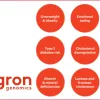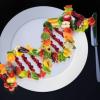
The Science Behind Nutrigenetics: Understanding the Genetic Influence on Nutrition
Posted on
The concept of nutrigenetics, the study of how genetics influence nutritional responses, has its roots in the broader fields of genetics and nutrition. While the term "nutrigenetics" itself is relatively modern, the idea of a connection between genetics and nutrition can be traced back to early observations and experiments.
Early Observations and Discoveries
The understanding that individuals respond differently to dietary components has been acknowledged for centuries. Ancient civilizations, such as Ayurvedic and Traditional Chinese Medicine, recognised the importance of personalised diets based on an individual's constitution and health conditions.
In the 20th century, several key discoveries laid the foundation for modern nutrigenetics. One significant finding was related to lactose intolerance. In the 1960s, researchers discovered that certain populations had higher rates of lactose intolerance due to the decreased production of lactase enzyme after weaning. This observation highlighted the genetic influence on how individuals digest and metabolise specific nutrients.
Genetic Diseases and Nutritional Links
The study of genetic diseases also played a crucial role in the development of nutrigenetics. Researchers have found that individuals with certain genetic conditions have specific dietary requirements to help to manage their conditions more effectively.
The Emergence of Modern Nutrigenetics
The term "nutrigenetics" was first coined in the late 1980s by American physician and endocrinologist, Dr. Artemis P. Simopoulos, a prominent researcher and advocate for the importance of omega-3 fatty acids in human health. She used the term to describe the genetic influence on the body's response to specific nutrients and how genetic variations can affect nutrient metabolism.
In the following decades, with the advancements in genetics research and the completion of the Human Genome Project in 2003, scientists gained a deeper understanding of genetic variations and their impact on human health. The ability to analyse genetic data more efficiently and cost-effectively allowed researchers to explore the relationship between genetics and nutrition on a broader scale.
Current State of Nutrigenetics
Today, nutrigenetics is a rapidly evolving field with an increasing body of research supporting the link between genetic variations and individual responses to diet. High-throughput genetic sequencing technologies have enabled large-scale studies that identify genetic markers associated with dietary responses, nutrient metabolism, and disease susceptibility.
Additionally the rise of direct-to-consumer genetic testing has fuelled interest in personalised nutrition. We now have the ability to offer you a super simple test that will provide insights into how genes may influence your response to different dietary components. Not only will you receive a detailed report but you will have a session with a qualified nutritionist who can break down the findings and help you to apply them in a practical way to improve your lifestyle.
LPA is an award-winning nurse-led clinic. Our philosophy is to help you age in a way that you feel confident and comfortable in yourself. We’re on a mission to win your trust from the off, by making your visit relaxed and easy and ultimately sending you on your way with a natural revitalised and more attractive version of you, so that you’re ready to conquer your world!
We are based in EC1 in the bustle of the city. We are registered with Save Face, the UK aesthetics regulatory body.
The Basics of Nutrigenetics
Nutrition is a fundamental aspect of human health and well-being. We all accept that what we eat directly impacts our energy levels, cognitive function, immune system, and overall longevity. While it is widely accepted that a balanced diet is essential for optimal health, recent scientific advancements have revealed that genetics play a significant role in determining how our bodies process and respond to different nutrients. This emerging field of research is known as nutrigenetics, the study of how an individual's genetic makeup affects their response to various nutrients and dietary components. Every person's genetic code is unique, and certain genetic variations can impact how our bodies metabolise specific nutrients, vitamins, and minerals. These genetic variations can influence everything from the way we process and store certain nutrients to the way certain foods affect our risk of developing chronic diseases like obesity, diabetes, and cardiovascular conditions.
Genes Affecting Nutrient Metabolism
Various genes are involved in the processing and metabolism of nutrients. For example, there are genes that have been identified to be associated with obesity risk and how individuals respond to certain dietary interventions. The FTO gene, in particular, has been linked to increased food intake and a preference for energy-dense foods, which can contribute to weight gain in some individuals.
Additionally, there are identified genes involved in fat digestion, which influence how our bodies handle dietary fats and therefore impact our cholesterol levels.
Personalised Nutrition and Dietary Recommendations
The traditional "one-size-fits-all" approach to nutrition may not be helpful for everyone. Nutrigenetics opens the door to personalised nutrition, where individuals can tailor their diets based on their genetic makeup. By understanding how specific genetic variations affect your actual nutrient metabolism pathways, means that we can now provide personalised dietary recommendations that take into account your specific unique needs, rather than the law of averages.
For instance, individuals with certain genetic variations that affect carbohydrate metabolism will benefit more from a diet that limits high-glycemic index foods to manage their blood sugar levels effectively, as opposed to focusing on fat reduction On the other hand, those with variations related to vitamin D metabolism might require higher dietary or supplementary intake of this crucial vitamin to maintain adequate levels in their bodies.
Implications for Chronic Disease Prevention
Nutrigenetics not only offers personalised nutrition but also holds promise in preventing and managing chronic diseases. By identifying genetic risk factors, individuals can make proactive dietary choices to reduce their susceptibility to certain conditions. For example, someone with a genetic predisposition to hypertension might be advised to reduce their sodium intake, while individuals with genetic markers associated with impaired antioxidant defence may be encouraged to consume a diet rich in antioxidants.
Conclusion
The science behind nutrigenetics is a hugely exciting frontier that highlights the intricate relationship between genetics and nutrition. Understanding how our unique genetic makeup influences our nutrient metabolism empowers us to make informed dietary choices that align with our individual needs and health goals. As research in nutrigenetics continues to advance, personalised nutrition is likely to become a cornerstone of preventive medicine, improving public health outcomes and enhancing overall well-being.
The field of nutrigenetics has come a long way since its early observations and discoveries. From ancient dietary practices to modern genetic research, the concept of personalised nutrition based on genetics has evolved into an innovative scientific discipline. The understanding that genetics plays a significant role in how our bodies process and respond to nutrients has the potential to revolutionise dietary recommendations and improve health outcomes. What an exciting breakthrough!

































